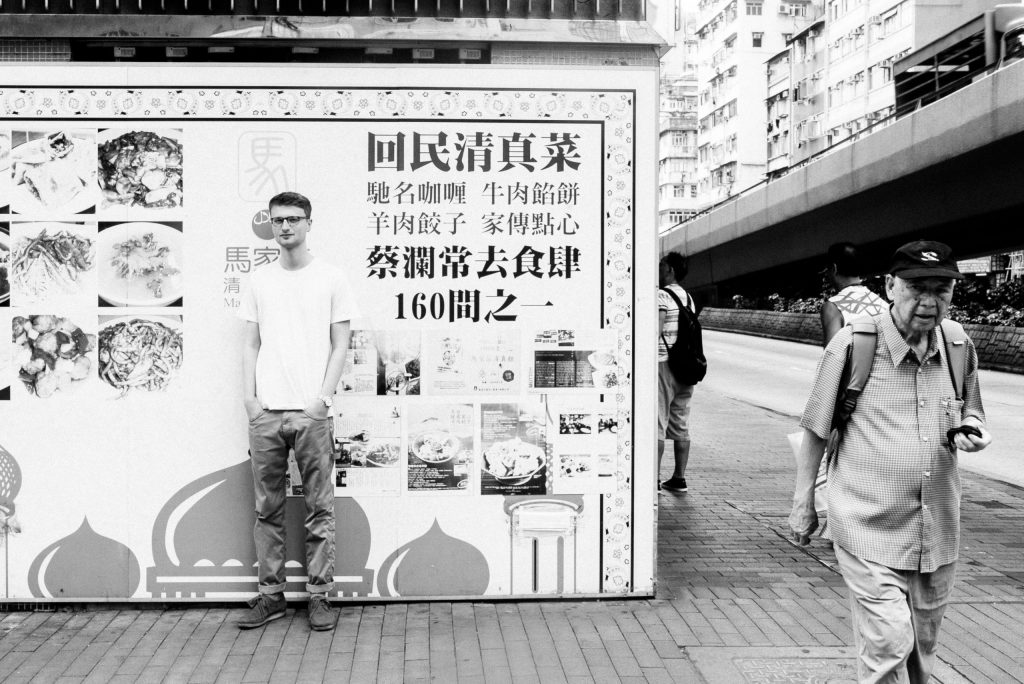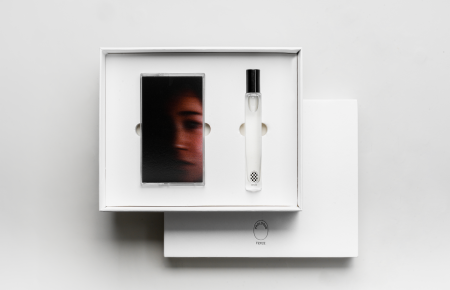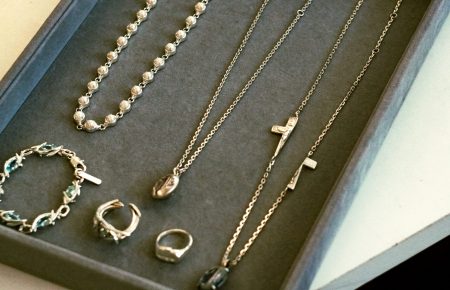In this Building the Brand, Eugene and Charis sit down with Alek Rose, MAEKAN’s second full-time apprentice who we had the pleasure of working with these past 28 days. Half debriefing, half feedback session, this episode examines some of the insights the soon-to-be graduate Alek has gained, as well as challenges he faced in his short few weeks in Hong Kong.
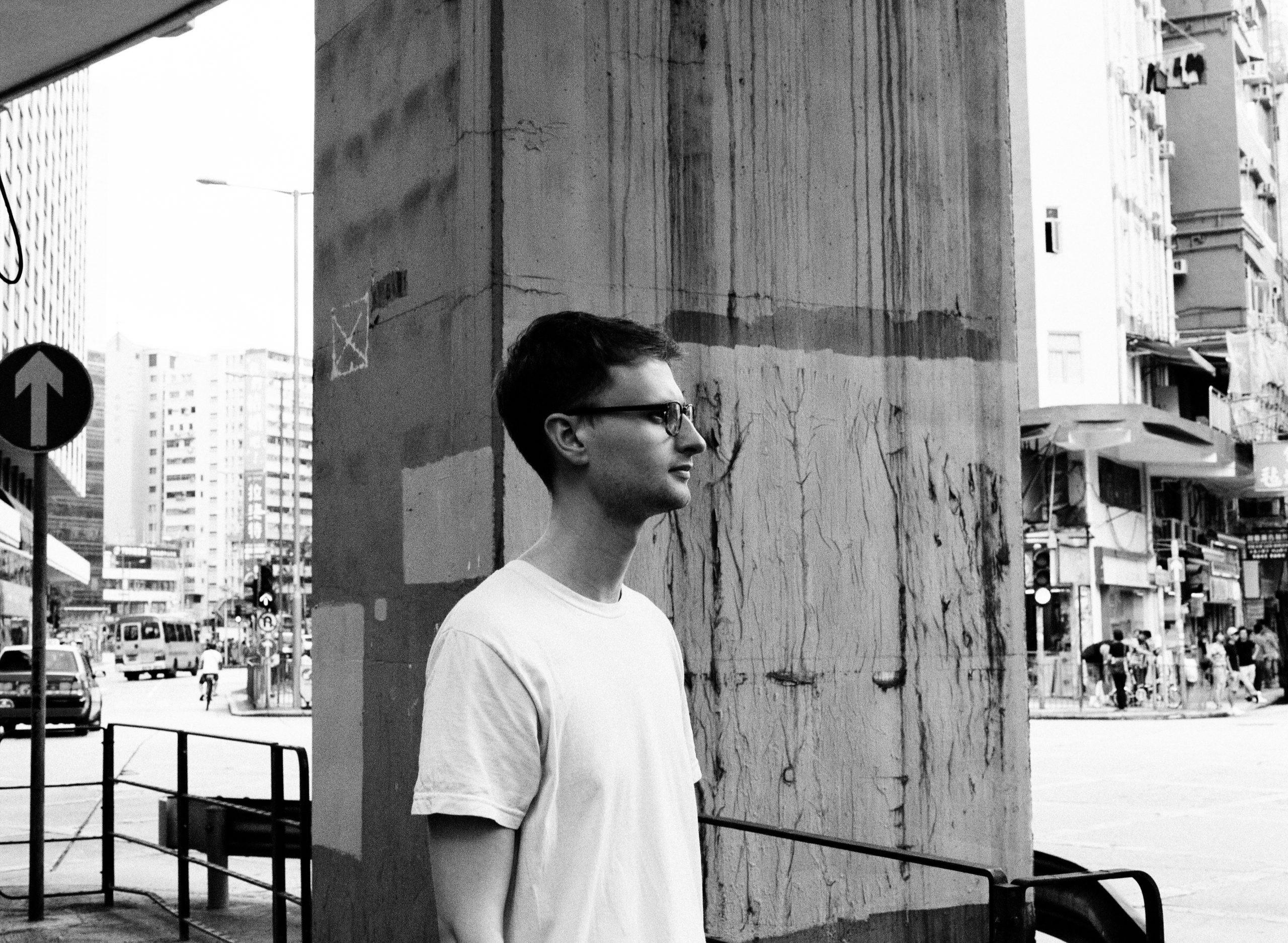
Alek, shortly after our last lunch before he headed back to London.
At MAEKAN, we always welcome a new face around the office especially when they join the team as an apprentice. For even the short period that an apprentice lends their time and energy, the rest of the team is that much better off for it. While the word “internship” draws mixed feelings in the corporate context—perhaps damningly even more-so for the creative industries—Eugene’s always tried to ensure that the terms “internship” and “apprenticeship” refer to two wholly different experiences.
In the case of Alek, we were fortunate to have been referred to him via cinematographer and director Luke Casey, a family friend of his and frequent MAEKAN collaborator. At the time, Alek was looking to gain more experience in editorial and publishing, while laying some valuable career track in front of him. He had finally bid farewell to his university library and the final exams he was cramming for. But for the graduate in the making, you might say it was a case of “out of the frying pan and into the fire” as he prepared to make the leap from his hometown of Lancaster in the UK to our office in Hong Kong.
Yet despite the jetlag, the humid Hong Kong summer and the steep learning curve, we’d say he rose to the occasion with aplomb (please forgive me, Alek).
“I don't see [reserving my opinion] as a deficiency at all in everyday life. I think it's actually one of my best qualities.
But I realize that valuable stuff does happen by making a mistake and saying stuff that doesn't necessarily seem like the most intelligent thing [...] where the value actually comes when you're just bouncing ideas off people.”
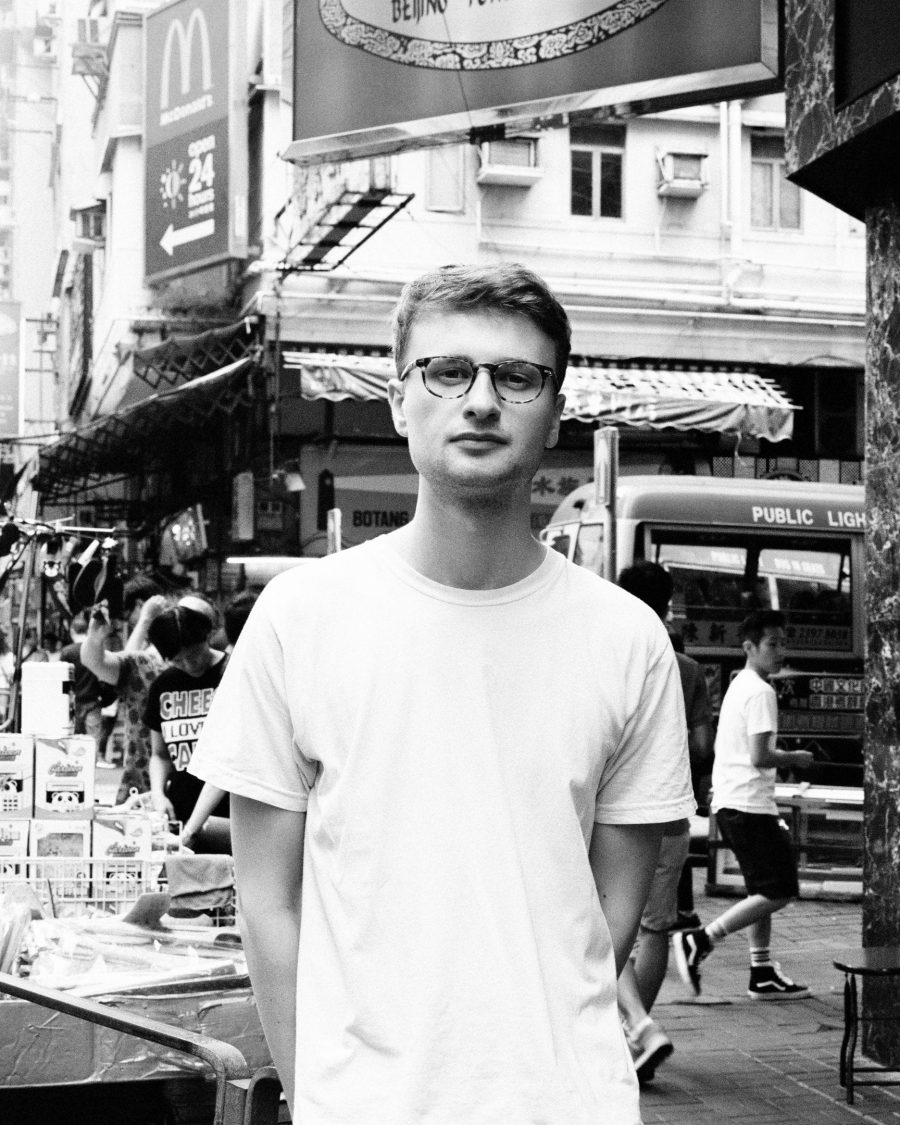
At MAEKAN, the story defines the medium. Some stories function best as written text, others hope to capture the emotion through an intimate audio experience. In cases such as this audio story, the transcripts we provide are done to the best of our ability through AI transcription services and human transcribers. We try our best, but this may contain small errors or non-traditional sentence structure. The imperfection of humans is what makes us perfect.
Eugene: Alek, how’s it going? It’s your second last day.
Alek: Yes, thank God. (Eugene laughs)
Eugene: So let’s start off with: Why do you want to work in editorial and publishing?
Alek: Because I’ve always written even from a kid I write stories all the time. I’ve always loved writing. And then it kind of fitted in with how my tastes developed with getting into fashion and culture in general, which were things that I was genuinely interested in, which I can focus on so much in uni and they kind of fit together perfectly in the world of media.
Charis: How did you hear about MAEKAN again?
Alek: I heard about MAEKAN through a family friend called Luke Casey who knows you guys.
Eugene: Great director. “Videographer’s” kind of maybe underselling him. Director.
Alek: And basically I was talking to him on family holiday saying I was coming out of university and wanted to go into publishing an editorial and he said, “I need to put you in contact with MAEKAN.” And like he sent me the website over and stuff like that and it was quite encouraging because whether it had been terrible or great I probably still would have been like, “mate, I need some experience can you know hook me up?” But it was really nice because the stories are actually great and stuff. Like, at that point, most of the stuff that I was reading was kind of Hypebeast, Highsnobiety stuff and seeing the other side, which is way more interesting and has something more profound to it was encouraging. As I said, if it had been terrible I probably still would have asked for an opportunity.
Charis: Why is it that even if we’d been terrible, you would have reached out for an opportunity? I’m just trying to get into your mind space.
Alek: I think it says quite a lot about the opportunities in London where I was coming out of university in the sense that — I think especially in the world of media — why would anybody give you an opportunity unless you can prove that you’ve already done it? Because there are like 500 other people take that spot. So I guess it says something about the fact that coming out of uni, I was ready to start at the very bottom and just basically take anything I could get.
Eugene: To that point you made about having 500 people in line. Do you think there’s a difference between the 500 people that could theoretically fill a role in a seat and who of those 500 are actually competent?
Alek: Well, I mean yeah, with the right direction, I think loads of people can do what I have done this month. Basically, if you’re teaching most people who have any basic grip of how to write, they could produce something is probably quite good. I don’t think I’ve done it that well in this month, but I don’t think I’ve found like a style yet.
I think that’s what distinguishes someone who’s great at a job and somebody who could just do it like anybody else. I think finding a style and people knowing instantly that it’s your work and it has the kind of flair to it like a confidence, which I get that it just means that: experience. But I think you’ve also got to want to find that style unless you have a driving enthusiasm for it from the get-go, then you’re not going to try and you’ll find that you get bored.
Eugene: Were you expecting anything different because this was not in London and this was in Hong Kong?
Alek: Well I came last summer for literally a week to visit Luke again. And I instantly noticed the different atmosphere. He kind of took us to a gallery opening and he took us to like lose the little things with this friends, and it’s just like a completely different atmosphere in the sense that people were super welcoming and collaborative.
Everything he was doing seemed to be with people he knew as a friend anyway and hung out with, not just on a work level, which I think is very different to London. For example, where everything seems you know somebody to work in unless they can benefit your company, you don’t need to do anything with them, whereas here it seems like you guys know everybody who’s opening a gallery and you know somebody who’s done the work there, or who’s helped design the poster and stuff like that. I just thought it was really nice.
Eugene: Do you agree with that point?
Charis: I do agree with that point. But it’s interesting to hear come from Alek because I think sometimes for us who are here, it can seem like the city is very small.
Alek: Yeah I guess that’s the flipside of it.
Charis: Yeah. Definitely a positive is that you know everyone and that is collaborative and it can be a really great environment to be working with one another and be friends and go out for dinner. But I also feel like maybe there’s not enough things going on in the city if I know everyone that is doing something.
Eugene: It’s interesting to hear your perspective because I think that if you stay here too long, the exact things you mention start to creep in, and people feel as though they’re inhibited from doing certain things. Like, “rent is expensive” —which it is. All these things are definite factors. But over the course last month or so, what were things you found to be the most challenging.
Alek: I think for me the most challenging thing was the podcasts, actually, just because I’m quiet like a non-talkative person in general. Like, I won’t speak unless I think I’ve got something to say.
Charis: That’s actually a good rule for life, though.
Alek: Yeah. Well, I think so, but I think a lot of people don’t do it (laughs). So the podcast where it was literally based around our voices is the only thing that was hard for me. Not ’embarrassment,’ not even ‘insecurity’. I don’t really know the word, but it kind of fell away pretty quickly when you just start a discussion.
Charis: Self consciousness?
Alek: Yeah, but I don’t think it’s even as much as “self-consciousness.” It’s just like a little wall that had to fall away because I’ve never known that people are listening to my voice and I don’t like people listening to my voice. Again, that also does sound too strong. It’s not that I don’t like it. I just don’t like to to force it upon people.
Eugene: How do you feel about it now having been behind the mic?
Alek: A lot more comfortable now. You kind of forget it’s there. And also I think that editing of audio changed the way I saw it as well.
Eugene: This is where I throw in the bit about “how the sausage is made.”
Alek: (laughs) Yeah exactly. Well, seeing “how you can make the sausage look a lot prettier after hearing—”
Eugene: “Tastier.”
Charis: This metaphor has fallen apart.
Alek: (laughs) “The sausage has fallen apart.”
Charis: How does the podcasting fit into your idea of publishing and writing?
Alek: It actually didn’t at all until I came here, which is interesting. That’s a good question because I never considered it at all in what I wanted to do, but it’s central to the MAEKAN concept in that it’s personal, intimate, goes a bit deeper. So I think it was really valuable to do it because I think it also affected my writing. You guys said this at the start, that it would affect the way that I wrote…
Eugene: …a script.
Alek: Yeah, a script. And like, “writing to be heard rather than writing to be read.” So it definitely made me think about the way I’m writing, in a more colloquial fashion as well.
Charis: What about this past month was surprising to you?
Alek: Just being in an office, really. (Charis laughs) But I’ve never been in an office before, and I guess this isn’t really like—
Eugene: This is an atypical office.
Alek: Yeah exactly. I think I’ve had quite a nice easing into office life, which will probably only go downhill. But it also surprised me how much I enjoyed the work, actually. Like, that sounds cheesy, but genuinely speaking, I felt towards the end of university that it was kind of dragging on a bit. And I was a bit vaguely disillusioned with what I was working to and the idea of paying so much to get a piece of paper at the end of it, which essentially means nothing, and I wasn’t particularly interested in most of the stuff I was writing about anyway. So it was really nice coming out of just doing my finals in a library where work is the biggest chore ever, where I can actually do work and it’s fulfilling.
Charis: Was there anything you were disappointed by, whether Hong Kong or MAEKAN or Eugene—I’m kidding —or yourself, even?
Alek: There were a few moments. It’s stuff I knew about myself already, but not planning and then really regretting it when it comes down to the fact that you haven’t planned enough. So there was one point where it was with the Julie Zerbo story. I’d done all the audio and then been pretty quick to export it and stupidly started deleting them to make my desktop look less cluttered.
And then a few days later, Elphick was like, “Oh, by the way. I need both tracks for Julie Zerbo rather than what one whole piece.” And I was like, home on the sofa and started sweating profusely. I was like, “Oh shit, I’ve deleted it all! I don’t know where to find this!” It was just things that working through a process and it did not disappoint me myself. Yeah, there were definitely points of learning where it could’ve gone smoother.
Eugene: How do you look at process now?
Alek: Process, being?
Eugene: Creative process.
Alek: From the outside it’s very easy to see a magazine — especially when I’m not knowing whether I want to go into one — seeing a magazine, it’s like everybody here knows exactly what they’re doing and MAEKAN looks like really like immaculate from the outside, like the website and stuff like that.
Eugene: Charis is laughing to herself.
Alek: Yeah, but then it’s funny. Like, this sounds bad on you guys, but it was really encouraging to get here and find out that you guys are actually all still learning and like the creative process isn’t just nailed down (Eugene and Charis laugh).
Charis: It’s so true! I’m not laughing because I disagree. I’m just laughing because it’s very true. And I do— I remember being the same way, actually. When I was in uni, I really wanted to go into magazines and I did my first unpaid internship — well, for credit — at Nylon magazine—
Eugene: Oh really?
Charis: Yeah, I was, like, 18.
Eugene: We’ll have to talk about this.
Charis: It was a different Charis, ya know? And having that same sensation, and then it was print and holding a magazine and being like, “oh, this is amazing! All these cool people, photos, etc.,” and then going there and being like, “nobody knows what they’re doing.” Not that they don’t know, but that everybody is also figuring it out.
Eugene: Yeah I think that’s the biggest concern a lot of people have is just there’s so much scrutiny, there’s so much visibility that everyone expects everything to be so good. Even myself, there’s a lot of things you learn doing this job because — I almost miss the times when I could just allow myself to do something and even if I was to be embarrassed, I’d be okay with it. Versus now, not even doing it.
Charis: The bar for you is too high.
Eugene: Well, yeah. And I want to remove the bar, in a way.
Alek: You need an alter ego.
Eugene: I also don’t want an alter ego because I feel that that is, in some ways, inauthentic.
Charis: Like it would be more genuine for people to see the Eugene that they think they know fall on his face, so to speak. Alek, I know you already had plans in mind for post-Hong Kong, but in any way have those goals or plans kind of shifted?
Alek: Yeah, hundred percent in the sense that I still recognize I’m going to have to do some stuff that isn’t necessarily what I consider authentic or the exact thing that I want to be writing.
But the idea that you don’t have to do it, that there are places out there that do still consider more than just an advert, which seemed to me like what the fashion media landscape looked like. But yeah, there is a point where you can actually say: “No. I’m not going to do that anymore. I want to write something else and it can be successful.”
Eugene: And do you think that—I don’t know if “shy” is the word—but just not being very proactive in wanting to talk until you have something to say is something that you’ll want to work on? Do you see it as a deficiency in terms of if you want to pursue more of this interview-style approach to storytelling?
Alek: Sorry, I don’t see it as a deficiency at all in everyday life. I think it’s actually one of my best qualities (Eugene laughs), but I think just realizing that actually really valuable stuff does happen by, as you said, making a mistake and saying stuff that doesn’t necessarily seem like the most intelligent thing to say in the first place. But that’s where the value actually comes when you’re just bouncing ideas off people. And I think I need to do that more instead of just thinking, “this is already a good idea, so I’ll say it.”
Charis: I think it still can be one of your best qualities as an editor-interviewer because I am similar to you and I don’t talk that much—
Eugene: Disagree.
Charis: —off of the mic, when I’m not with Eugene and as an interviewer it’s really helpful because mostly you’re just listening to someone and waiting to ask the right question.
Alek: Kind of like exactly what Louis Theroux does. Wait, do you not know who Louis Theroux is?
Eugene: Is he British?
Alek: Yeah. The best documentary maker ever. Please, please, go and watch his documentaries. He’s basically so good because instead of what interviews usually do, which I feel is coax people into saying what they want, Louis Theroux just stays silent and lets the person kind of build their own bed and line it. So yeah, as you said, it’s a very good quality.
[INTERMISSION]
Alek: I actually have some questions for you guys. Ok, so you actually answered one of them already, which was did you guys do apprenticeships.
Charis: Oh! I want to know about Eugene.
Eugene: I mean, I guess you could say their apprenticeships were just doing so at the love of something. Although I’d never really been in a very structured environment where, “hey, you are an intern here.” It was more like, “you have a role to do and just do it,” right? I so I wasn’t exactly learning. I’ve largely been self-taught my whole career.
Alek: Do you think that the world of media has changed?
Eugene: I think I definitely entered the world at a different time and to be a publisher now is a lot more difficult than it was 10, 12, 15 years ago. The competition in publishing has arguably changed. You don’t have as many magazines to compete against. But what do you have, you have social media where individual influencers could theoretically be a media company. You have Netflix, Spotify, all these things that you’re up against. So the self-taught method still works, but it’s just more challenging in media.
Charis: Initially after Nylon, I interned throughout college. But I mostly took like minimum wage internships, which might have been cutting myself off from certain learning opportunities if I had been taking totally unpaid internships. So I had very specific tasks as in I was hired to do certain things, which was fine, like I understood that I was being paid to do a job.
But I don’t think I had as many opportunities in those situations to just learn freely from different people. And the best apprenticeship I have that deserves that term was with a professor who actually you know because we had him on a MAEKAN Session.
I had a professor who was just really carrying and took an interest in my education and offered me an apprenticeship just with him. Essentially to learn from him. That was the best thing I did.
Eugene: And his name is…
Charis: Irwin Chen. Shout out to him. Still a professor at the new school doing really interesting stuff at the intersection of journalism and design actually.
Alek: What value comes from an internship, on the other side of the spectrum for you guys. Because obviously for me it’s pretty tangible: I have some concrete experience now that I can put on Linkedin. (Eugene laughs). What’s your what’s the value for you guys, if any.
Eugene: I would say that there’s definitely a lot of value and I think that’s kind of a two-part discussion that we also talked about in an editorial meeting a few weeks ago just about the value of work or just what role do internships, unpaid internships play.
But to take one step back, the value for us is I think it helps you refine your process a bit more because we go through the motions, but when you’re teaching somebody, it needs to be a little bit more formulaic. And it also allows you to look at inefficiencies and ways to potentially optimize it.
Charis: To add on to what Eugene said: If MAEKAN is prepared adequately for an apprentice to come in, it’s a real practical help as in you being here or someone else being here does actually alleviate our workload, so there’s that. And that’s real value that we get from it.
Eugene: Like real workload. Like, not making coffee. You never—please go on the record and say you never had to make coffee.
Alek: I didn’t make any coffee.
Charis: He also doesn’t drink coffee.
Eugene: Doesn’t matter. I drink coffee. And you drink coffee.
Charis: But the point is that it’s not just you’re not just doing work that isn’t helpful, and we’re not just teaching you to do things that we don’t use. You are actually doing work that means someone else doesn’t have to do it.
And that frees them up to do other stuff and that’s a real value that we will miss sorely. To add on to the new insights thing is also just so nice to have another face in the office, another voice with different backgrounds. You’ve been here, so you know that the six of us know each other very well and so it’s just great to have someone else to bounce things off of.
Eugene: If someone can prove themselves over the course of whether it’s a week or four weeks, it’s adequate preparation to see if this person can actually fit into a longer term plan like. I told Charis this as an aside after week one. I’m like, “yo, I think this guy has like the skills to potentially be someone that we could work with ongoing.”
And, you know—full transparency—when we were discussing before like I would say we were pretty flakey. And I think part of it was like we’re always kind of skirting around the idea of like the payment side of it and I think that’s a big discussion right now around like—
Charis: Eugene had a bit of a crisis because I don’t know if you aware of this, but the founder of No Jumper on Twitter made some comments about unpaid internships. He basically suggested that: “if you are complaining about unpaid internships, then you don’t have what it takes to make it.” And then Eugene messaged me privately and was like, “have you been following this? What do you think about it?” because—
Eugene: There was a whole sort of Twitter storm yeah that ensued.
Charis: Yeah, because we have to know for ourselves too, right? Like, are we doing something that is fair?
Eugene: Yeah. I mean, at the very least, we were like “let’s try to take care of his meals, let’s try to do what we can.” Like, hopefully this wasn’t like a very taxing sort of month for you. Because we don’t have a ton of money to pay, but we try to pay them what it is maybe a little bit, but very meaningful to us.
So I think that’s the one thing that was always looming over me a little bit was making sure “hey, if he’s going to come in, make sure he has an upstanding experience or an amazing experience that you deem is of equivalent value exchange.”
Alek: Yes. As you said yesterday, you did say obviously, any relationship works on the fact that there are two parts to it who give different things. I was interested to hear what the side of it was for you guys.
Eugene: I mean, ultimately we definitely want to create a sustainable creative culture ecosystem right and that needs money.
Alek: I think that’s probably what stands out for me, about MAEKAN, actually. So that’s success. I have one last question it’s a bit of a banger and I want to add a complete truth.
Eugene & Charis: Okay.
Alek: Did you have expectations of me, and did I live up to them if you did? Did I fall short in any way or did I differ in any way? Like in work, out of work?
Charis: So Eugene messaged me about a week after you’d come in and said, “What do you think of Alek?” I’m trying to remember what I said. I can’t remember.
Eugene: You actually didn’t have any sort of polarising opinion. Like it wasn’t negative, but you were also not as excited as I was.
Charis: I was not glowing. He was glowing. Go ahead.
Eugene: But you were not glowing because you just hadn’t worked with him enough.
Charis: Yeah that’s true. I was out your first week.
Eugene: I mean for me personally, I actually was pretty surprised. I think that if I look back on the last four weeks I think were really really well to the point where, like I said, within the first week I was like: “Hey, there is a good opportunity here for us to continue working on.”
This to me is a good sort indicator of what success can look like. The things that I’m always aware of, but I never really buy into, is the perception of how youth culture is currently and how it stacks up with reality. It’s like, “Oh, kids these days are X, Y, Z.”
But I guess it was a question I was going to ask earlier because your interest in things that have a little more substance, a little bit more “intellectual rigor”—not because we’re trying pretentious or being “smart.” It’s just that those are things that we feel are necessary.
It’s like at the age of 22, they’re probably not things that we expect. But I think you’ve demonstrated and so did Willie last year. So it was, “Hey, these are people that actually have this sort of insight into the world around them that doesn’t fall in line with what you think.”
Charis: I think I definitely had the very basic expectation of you being able to do work that is tedious—well, this is the expectation I have of all people who work at MAEKAN including Elph, Nate and Eugene. It’s that we all have to pull our weight when it comes to writing social copy or writing the Briefing, things that aren’t exciting and you definitely fulfill that. It has been wonderful to have you write the Briefing, honestly. Because—
Alek: I’ve actually really enjoyed the Briefing.
Charis: Oh, thank God. That’s what I love to hear, because I usually do it and I don’t love it. So it’s been really great. And I think I also had an expectation that I don’t know if I’ve seen you fulfill—maybe it’s discomfort just meeting us and only having a month—is to bring up things that you would like to do. And I would really like to see that.
What is a story that you want to do that is your own? And yes of course, like there is an expectation of each of us to do assignments and to pull our weight for just group projects. But I am interested: What would you want to write about on your own and I have kind of seen it in The Analysis and things that you picked, but it’ll be interesting to see.
Eugene: To be continued in London!
Charis: I think was a good question too: what would you recommend to other people for getting something out of an apprenticeship, or if you’ve learned something new.
Alek: Basically, I think to get the best of an apprenticeship—obviously this is my first—but what instantly stands out is just to accept at the start that you’re gonna make mistakes. And to not think that when you’re going into the office, to recognize that everybody knows you’re there to learn, rather than to be instantly good at everything.
I think at the start I was trying to be instantly good at everything and rather than thinking of myself as an apprentice, I was like, “I need to work on the same level as everybody here who’s been doing it for years.” Then, I slowly realized actually I’ve got to ask for help a bit more often because I’m just wasting time off on doing something wrong.
Eugene: It is important to have a sort of working environment that is not in promotion of shitty work, but just in promotion of “hey, test yourself. Make mistakes.”
Charis: I think also just accepting the reality that we also make mistakes and we have to be honest with each other.
Eugene: I guess…I’m just kidding!
Charis: It’s not true in the slightest! We make mistakes all the time! We just DM each other about it.
Eugene: Actually this is my my last question: What is one musical track that sums up your last four weeks? (Charis laughs uncontrollably)
Alek: Wow. Um…this is too difficult. I can’t do it. Can I—can I record a bit later?
Eugene: You know what we’ll do is like we’ll let it run. Elphick will pop in the track and…
Charis: Yeah…
